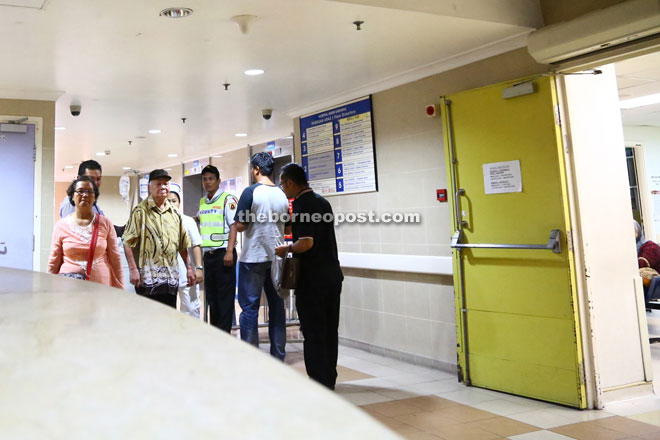
Visitors and staff walk through Sarawak General Hospital’s lift lobby. File Photo
Implementation of Full Paying Patient Scheme raises fears that specialists would be overworked, care for ordinary patients affected
KUCHING: The implementation of the Full Paying Patient Scheme (FPPS) scheme at government hospitals has raised concerns that the quality of care received by ordinary patients who cannot afford the FPPS would be compromised.
Among the other concerns is the likelihood that specialist doctors might not get enough rest as they have to attend to two sets of patients.
Assistant Minister for Public Health Datuk Dr Jerip Susil explained that the scheme was introduced by the Health Ministry to provide more avenues for specialist services in government hospitals and extra income for doctors in the government service as an incentive for them to stay on.
“Under the programme, the government is delineating a portion of beds in government hospitals to make them into wards for patients who are willing to pay full medical cost like in the private sector. The service provided under the scheme is like that of the private hospitals where patients would be given priority but they have to pay for everything they used.
“The doctors providing the medical consultations are still government doctors. This scheme will give patients a choice of getting faster specialist
treatment that they get in private hospitals in government hospitals,” he said when contacted yesterday.
Director-general of Health Datuk Dr Noor Hisham Abdullah in a statement in October this year clarified that the FPPS did not mean that the healthcare services in the government hospitals would be privatised.
Dr Noor Hisham said the existing health care services that were subsidised by the government would continue and further strengthened through various health system core transformation by the Health Ministry.
“For this high subsidy health care services patients are only required to pay a minimal subsidised amount depending on the class of treatment and facilities provided to the patients.”
He said the focus on FPPS was for people who could afford to pay full medical cost whereby they would have the option to obtain highly specialised medical treatment in selected government hospitals.
He added that there were patients who were ready to choose the FPPS after they were referred from private hospitals to government hospitals because of the government hospitals had the advantage of specific expertise.
Dr Noor Hisham said among the advantages of this scheme were patients could choose the specialist doctor to provide treatment and patients could enjoy various facilities in executive ward, first class or comparable.
“All facilities that will be provided depend on existing resources, specialisation and facilities. Patients that have registered as FPP patients will be charged full payment without government subsidy to enjoy specialised medical treatment by the appointed medical officer to conduct FPPS service in selected government hospitals.”
He said a portion of the income received by the government through FPPS would be given to the specialist doctors registered under this service, adding that the rate for medical services for FPP patients was subjected to Full Paying Patient Fee Act (2007).
According to Dr Noor Hisham, the payment method of the FPP bill could be done through cash, credit card, debit card or bank draft.
He added that guarantee letter from private firms and medical insurance that had agreement with the Ministry of Health Finance Division could also be used for financing the cost of treatment under FPP.
Deputy Health Minister Datuk Seri Dr Hilmi Yahaya recently announced that the scheme which was implemented as a pilot project in Selayang and Putrajaya Hospitals in 2007 would be extended to eight other government hospitals in January next year.
The eight other public hospitals are in Kota Bharu, Kuala Terengganu, Kuantan, Temerloh, Ipoh, Kuala Lumpur, Klang and Seremban.
However, the Sarawak Heart Centre in Kota Samarahan has implemented the FPPS in January 2015.
State Health Department director Dr Jamilah Hashim, when contacted by The Borneo Post yesterday, said patients who opted for the scheme were usually seen by the medical specialists outside office hours.
“Sarawak Heart Centre is the only one implementing (FPPS) at the moment. These patients are seen outside office hours,” she said when asked whether FPPS had been extended to Sarawak public hospitals.
